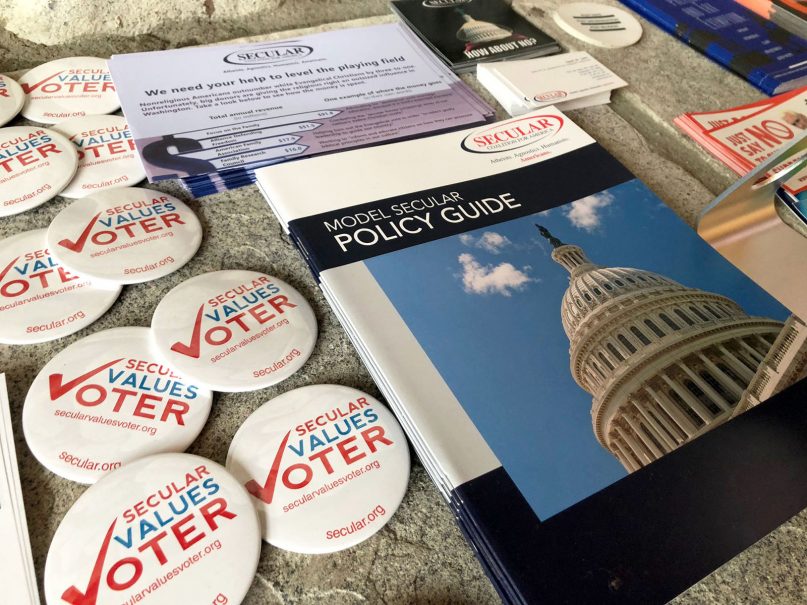(RNS) — A new group is launching an effort to court nonreligious voters for Joe Biden and Kamala Harris, hoping to mobilize a fast-growing — and deeply liberal — community to benefit Democrats in November.
The “Humanists for Biden” group, a project of the Secular Democrats of America, unveiled its plans on Monday (Sept. 28). The group is chaired by Greg Epstein, the humanist chaplain at Harvard University and the Massachusetts Institute of Technology.
“The humanist and nonreligious community is poised to be a very significant part of this presidential election in that we represent maybe 30% or so of Democratic voters,” Epstein told Religion News Service.
The group also announced a slate of co-chairs that includes Sarah Levin, who also co-chaired the Democratic National Convention’s Interfaith Council and heads Secular Strategies, an organization that mobilizes secular voters.
“Humanists for Biden marks the first time representatives of the nation’s growing number of secular Americans have been invited to participate in a coalition of communities of faith and conscience, working together on a Presidential campaign,” read a press release from the group. “The Biden-Harris campaign is working to create the most inclusive campaign and administration in the history of American politics, and we are honored to take part in this effort.”
Epstein said Humanists for Biden hopes to reach a broad swath of atheists, agnostics and other religiously unaffiliated voters who make up the largest belief group in the Democratic Party, constituting around 28% of its members, according to political scientist Ryan Burge.
While some are atheists and agnostics, other unaffiliated Americans still believe in God or pray regularly, according to a 2019 Pew Research study.
Even so, Epstein argued that the many nonreligious Americans are united by “humanistic values,” such as a belief in science as “the best tool that we have to create a healthy world,” as well as support for racial justice, pluralism and inclusion.
“We stand as humanists and people united by humanistic values for basic human decency, empathy and compassion that we feel that the Biden-Harris campaign represents far more than its competition,” he said.
Religiously unaffiliated voters, despite backing Democrats over Republicans in the 2018 midterms 75% to 22% according to Pew, have been criticized in the past for relatively low turnout on Election Day compared to other groups.
But Epstein pointed to new research that suggests religiously unaffiliated turnout is heavily impacted by the fact that it is largely made up of young voters who are also known for underperforming on Election Day.
What’s more, he said the group can only benefit from targeted mobilization, something Democrats have rarely done in the past.
“With a group like that that supports you so strongly and leans so heavily in your direction, you want to mobilize that group as much as possible,” he said.
Humanists for Biden is not officially part of the presidential campaign, but Epstein said campaign staff — including national faith outreach directors for both the Biden-Harris campaign and the Democratic Party — are slated to appear at the group’s first official event on Thursday.
“We feel supported and valued, and that has absolutely never been the case before for our community at this level,” he said, adding that Rep. Jared Huffman, a California Democrat and humanist, will also speak at their upcoming event.
The group has even selected a swing state where it can target its efforts: Arizona, where around 27% of the population is unaffiliated, according to Pew.
Epstein pointed out that Arizona is home to lawmakers such as Athena Salman, a state House member who identifies as an atheist and as a humanist. The state is also represented by Kyrsten Sinema, a Democrat and the only U.S. Senator who identifies as religiously unaffiliated.
The ultimate goal of the initiative, Epstein insisted, was not only to generate “historic turnout” among secular and nonreligious Americans, but also to build a stronger coalition with religious liberals.
“We recognize that their deeply held religious values resonate strongly with our humanist values,” he said. “We simply want to be a part of the conversation. We want to be in the tent. We want to be able to fully help as equals.”





